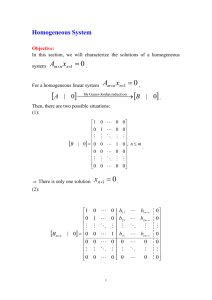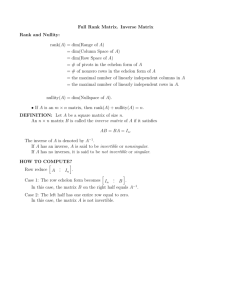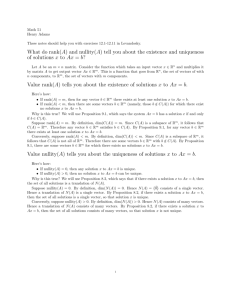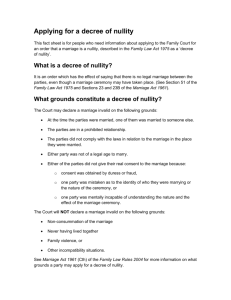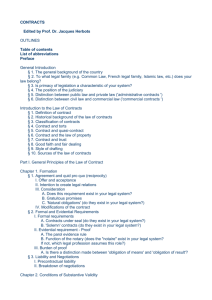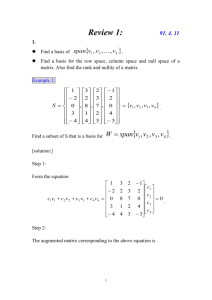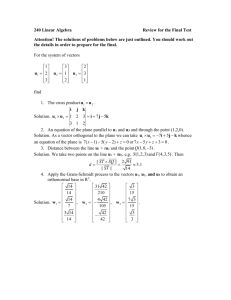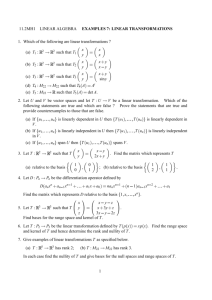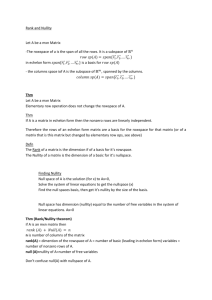NULLITY of CONTRACTS A Précis 1. Types of Nullity There are two
advertisement
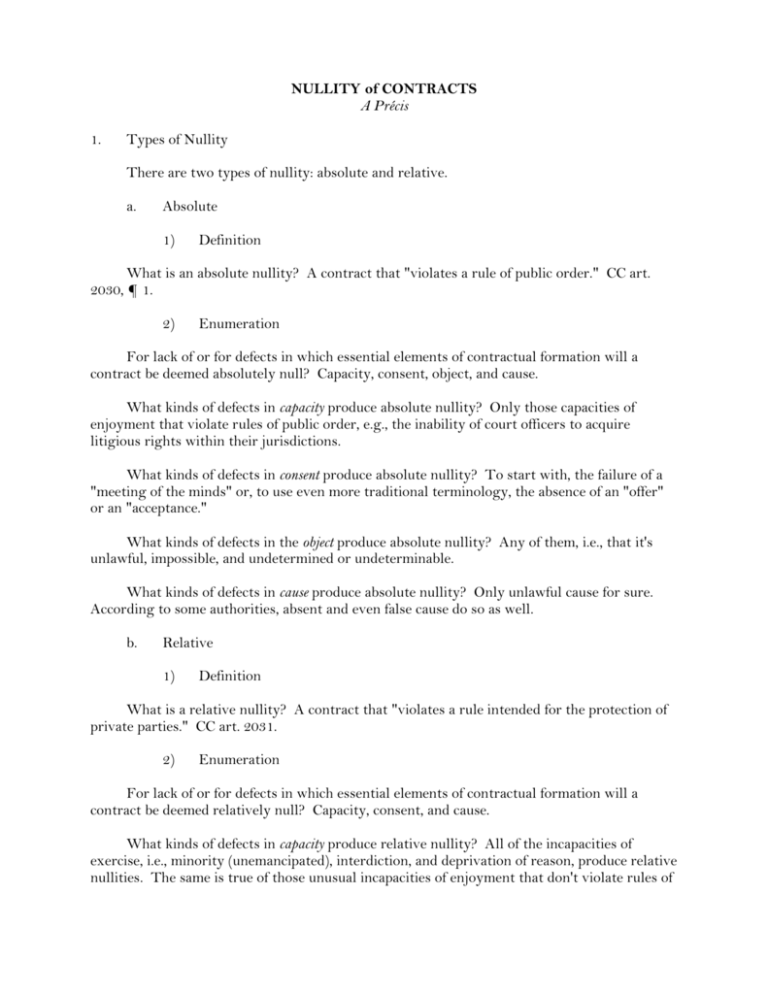
NULLITY of CONTRACTS A Précis 1. Types of Nullity There are two types of nullity: absolute and relative. a. Absolute 1) Definition What is an absolute nullity? A contract that "violates a rule of public order." CC art. 2030, ¶ 1. 2) Enumeration For lack of or for defects in which essential elements of contractual formation will a contract be deemed absolutely null? Capacity, consent, object, and cause. What kinds of defects in capacity produce absolute nullity? Only those capacities of enjoyment that violate rules of public order, e.g., the inability of court officers to acquire litigious rights within their jurisdictions. What kinds of defects in consent produce absolute nullity? To start with, the failure of a "meeting of the minds" or, to use even more traditional terminology, the absence of an "offer" or an "acceptance." What kinds of defects in the object produce absolute nullity? Any of them, i.e., that it's unlawful, impossible, and undetermined or undeterminable. What kinds of defects in cause produce absolute nullity? Only unlawful cause for sure. According to some authorities, absent and even false cause do so as well. b. Relative 1) Definition What is a relative nullity? A contract that "violates a rule intended for the protection of private parties." CC art. 2031. 2) Enumeration For lack of or for defects in which essential elements of contractual formation will a contract be deemed relatively null? Capacity, consent, and cause. What kinds of defects in capacity produce relative nullity? All of the incapacities of exercise, i.e., minority (unemancipated), interdiction, and deprivation of reason, produce relative nullities. The same is true of those unusual incapacities of enjoyment that don't violate rules of public order (if there are any). What kinds of defects in consent produce relative nullity? All of the vices of consent, i.e., error, fraud, duress, and lesion. What kinds of defects in cause produce relative nullity? According to some authorities (the better-reasoned ones, in my judgment), absent and false cause. 2. Invocation of Nullity a. Modes of Invoking Nullity The nullity of a contract can be invoked or asserted in either of two ways. What are they? Through (i) an "[a]ction for annulment," CC art. 2032, ¶1, or (ii) a "defense against an action on the contract," id. art. 2032, ¶ 3. Nullity, then, can be used as either a sword or a shield. b. Persons Entitled to Invoke Who's entitled to invoke the nullity through an action or a defense to an action? It depends. On what? On whether the nullity is absolute or relative. 1) Absolute Who can invoke an absolute nullity? "Any person," even "the court on its own initiative." CC art. 2030, ¶ 2. 2) Relative Who can invoke a relative nullity? "[O]nly . . . those persons for whose interest the ground for nullity was established." CC art. 2031, ¶ 2. Examples: in a case of incapacity, the incapable (or his representative); in the case of error, the party in error; in a case of fraud, the defrauded party. c. Obstacles to Invocation What obstacles might possibly stand in the way of the invocation of nullity? It depends. On what? Several factors, among them, the kind of nullity, the kind of mode of invocation, and the kind of defect in the contract. 1) Absolute Nullity a) Action to Annul Imagine that the source of a given absolute nullity was an illegal object or cause. Is there any set of circumstances under which a party to that contract might not be able to bring an action to annul it and, in so doing, to recover his performance? Yes. What? If, at the time the contract was made, he "knew or should have known of the defect that makes the contract null." CC art. 2033, ¶ 2. Is this obstacle to bringing an action to annul an absolute nullity present i under any other circumstances? No. Are there any other possible obstacles to bringing an action to annul an absolute nullity, either in this or in any other situation? No. Not prescription? No. Why not? For absolute nullities, there's no prescription. Authority? CC art. 2032, ¶ 1. Not confirmation? No. Why not? For absolute nullities, confirmation is not possible. Authority? CC art. 2030, ¶ 1, s. 2. b) Defense Are there any possible obstacles to invoking an absolute nullity by way of a defense? No. Not knowledge of the defect, in the event of an illegal object or cause? No. Authority? CC art. 2033, ¶ 3 ("Absolute nullity may be raised as a defense by a party who, at the time the contract was made, knew or should have known of the defect that makes the contract null.") Not prescription? No. Why not? For absolute nullities, there's no prescription. Authority? CC art. 2032, ¶ 1. Not confirmation? No. Why not? For absolute nullities, confirmation is not possible. Authority? CC art. 2030, ¶ 1, s. 2. 2) Relative Nullity a) Action to Annul There are two potential obstacles to an action to annul a relative nullity: prescription and confirmation. 1] Prescription What's the prescriptive period on an action to annul a relative nullity? "[F]ive years from the time the ground for nullity either ceased, as in the case of incapacity or duress, or was discovered, as in the case of error or fraud." CC art. 2032, ¶ 2. 2] Confirmation a] Definition What's confirmation? Does the Civil Code define it? Yes. Where? CC art. 1842. What does it say? "Confirmation is a declaration whereby a person cures the relative nullity of an obligation." The doctrine provides much the same definition. As Professors Weill & Terré put it, "[c]onfirmation is the juridical act whereby a person who can avail himself of the nullity of another act renounces his right to invoke it." WT, Oblig. § 307, at 351. Note that this juridical act is unilateral. b] Prerequisites 1} Substantive There are three prerequisites for a valid confirmation. First, the confirmation "must emanate from the person who can avail himself of the nullity." In some instances, of course, this "person" may be either the party to the act or his representative, e.g., in the case of an act ii executed by an interdict, either the interdict or his curator can confirm. Second, "the vice with which the act was tainted" must "come to an end" before the confirmation, at least where the party himself, rather than his representative, does the confirmation. It makes no sense to talk of confirmation by one who's still an interdict or who's still under duress. Third, the confirming party must act en pleine connaissance de cause, that is, with full knowledge of the vice and with the intent to cure it. 2} Formal Are there any formal requirements for a confirmation? Don't be misled by the second paragraph of CC art. 1842. What does the third paragraph suggest? A confirmation can even be tacit. And look at comment (b): any kind of evidence of confirmation is permissible. So, is any particular form really required? No. c] Effects What are the effects of confirmation? 1} Parties As between the parties, the effect is, as CC art. 1842 suggests, to "cure[ ] the relative nullity." Or, as Professors Weill & Terré put it, "it's effect is to cover up the vice with which the act was tainted." And as of when is this cure supposed to take place? Look at CC art. 1844: "The effects of confirmation . . . are retroactive to the date of the confirmed . . . obligation." 2} Third Parties As a general rule, a confirmation has the same effects as of the same time vis-a-vis third parties, i.e., retroactive cure. But there's an exception: it won't have those effects in any case in which to give it retroactive effect would impair the rights of a third party. NOTE: What about knowledge of the defect? Would that bar an action to annul a relative nullity? No. Knowledge of the defect is an obstacle only with respect to actions to annul certain kinds of absolute nullities. b) Defense Are there any possible obstacles to invoking a relative nullity by way of a defense? Only one: confirmation. There are no others? No. Why not prescription? "Nullity may be raised at any time as a defense against an action on the contract, even after the action of annulment has prescribed." CC art. 2032, ¶ 3. Not knowledge of the defect? Knowledge of the defect is an obstacle only with respect to actions to annul certain kinds of absolute nullities. 3. Effects of Determination of Nullity a. Between the Parties: Restoration iii What are the effects of a determination that a contract is null as between the parties? The contract "is deemed never to have existed." CC art. 2033, ¶ 1, s. 1. From which conclusion what follows? "The parties must be restored to the situation that existed before the contract was made." Id. s. 2. What does that mean? That each party must restore to the other the performance, if any, that he has received. And what form is this restoration to take? If it's possible and practicable, the restoration is to be made "in kind," i.e., each must restore the very thing he received. But what if it's impossible or impracticable to do that? The restoration may be made through a monetary award. When might restoration in kind be impossible or impracticable? Where (i) the contract called for the performance of some sort of service (how could a client return "in kind" legal services he's received from an attorney) or (ii) the contract involved a "thing" that, since the contract was made, had been consumed, destroyed, or sold to a third person in good faith. b. As to Third Parties What are the effects of a determination that a contract is null as against third parties? That depends. On what? On two things: (i) whether the contract was onerous or gratuitous and (ii) whether the third party was in good or bad faith. Here are the possible scenarios and their corresponding results: (i) onerous, good faith: no adverse effects; (ii) onerous, bad faith: full adverse effects; (iii) gratuitous, good faith: full adverse effects; (iv) gratuitous, bad faith: no adverse effects. So, it's only if the contract is onerous and the third party is in good faith that he's protected? Yes. iv
